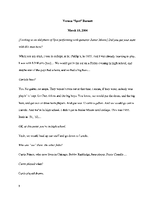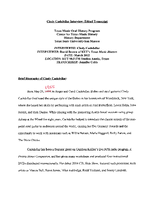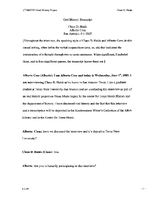Interview with Vernon "Spot" Barnett, March 10, 2004 - transcript
Description
Allen Olsen interviews Spot Barnett.
Spot talks about his earlier jazz music career in junior high through high school. He talks about listening to music on the radio station KCOR and playing music from L.D. Harris' book. He explains how white people have been taking credit for the music Black people have created. He talks about the band and gigs he'd play in college. He discusses recording his first record and starting to play gigs at the Ebony Club. He describes becoming the leader of his band, trying out different combinations and band names. He mentions other artists he knew and played with when they were younger. He tells a story how his band drove up towards Chicago and played a gig. He briefly talks about his marijuana case and the time he served in jail. He gives his opinion on whether another race can play black music and speaks about his family. He talks about the diversity in San Antonio. He gives his thoughts on what West Side Sound is and what it includes. He discusses his religious upbringing and his current faith. He explains the politics and economics with the music industry.
Spot talks about his earlier jazz music career in junior high through high school. He talks about listening to music on the radio station KCOR and playing music from L.D. Harris' book. He explains how white people have been taking credit for the music Black people have created. He talks about the band and gigs he'd play in college. He discusses recording his first record and starting to play gigs at the Ebony Club. He describes becoming the leader of his band, trying out different combinations and band names. He mentions other artists he knew and played with when they were younger. He tells a story how his band drove up towards Chicago and played a gig. He briefly talks about his marijuana case and the time he served in jail. He gives his opinion on whether another race can play black music and speaks about his family. He talks about the diversity in San Antonio. He gives his thoughts on what West Side Sound is and what it includes. He discusses his religious upbringing and his current faith. He explains the politics and economics with the music industry.








